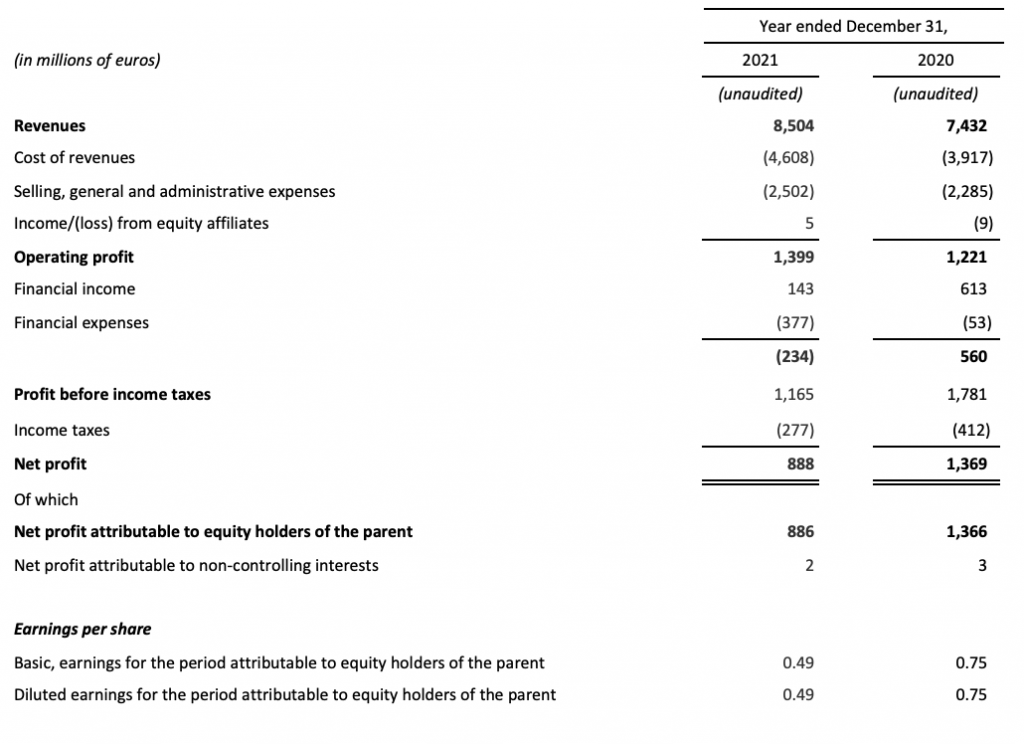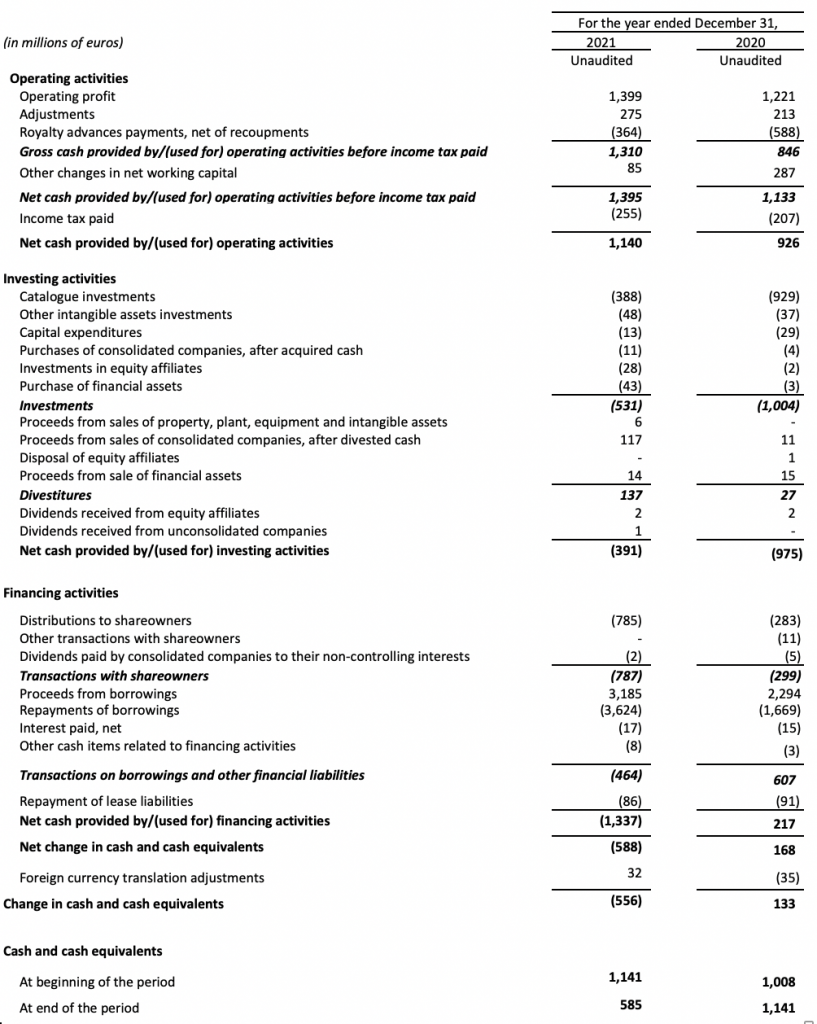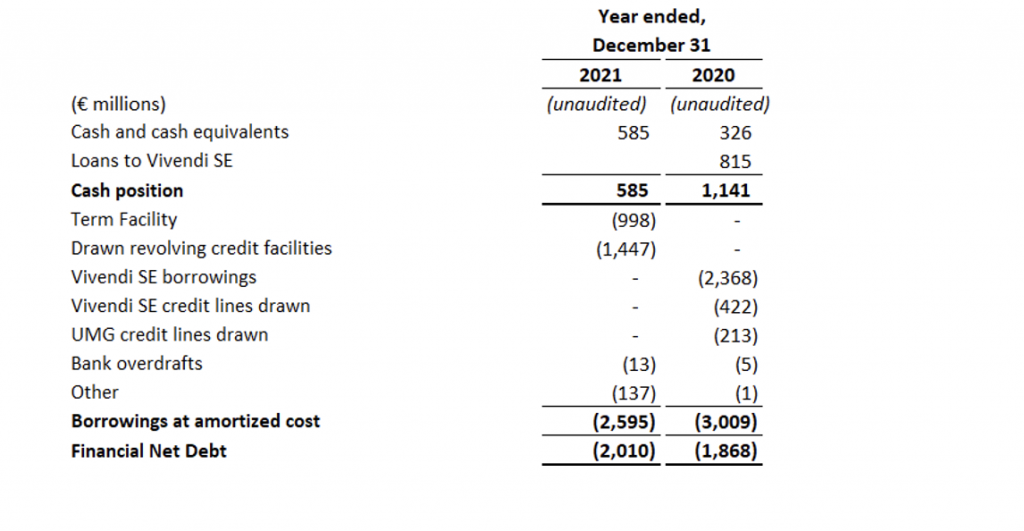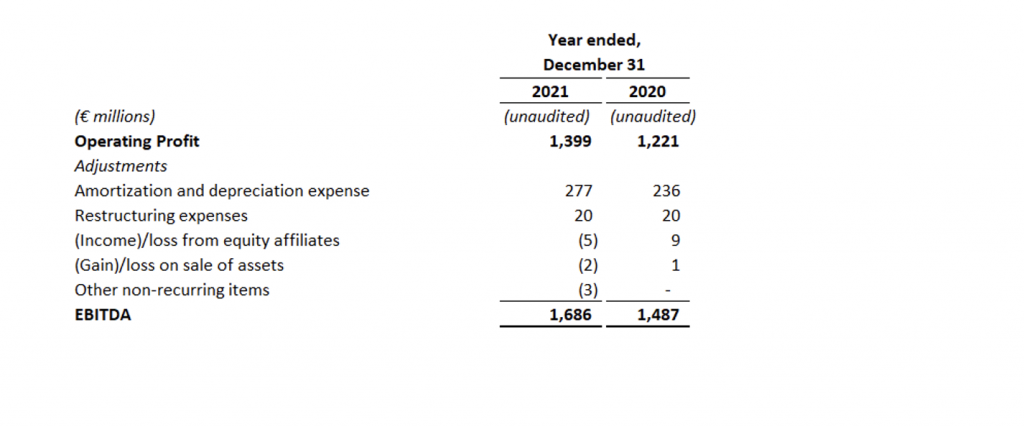Universal Music Group N.V. Reports Financial Results for the Fourth Quarter and Full Year Ended December 31, 2021

Universal Music Group N.V. Reports Financial Results for the Fourth Quarter and Full Year Ended December 31, 2021
Summary FY 2021 Results[1]
- Revenue of €8,504 million, representing growth of 17.0% year-over-year in constant currency, driven by strong growth across all segments
- Recorded Music subscription and streaming revenue grew 19.8% year-over-year in constant currency
- Adjusted EBITDA increased 20.9% year-over-year in constant currency driven by the revenue growth and Adjusted EBITDA margin improved 0.9pp year-over-year to 21.0%
- Net cash provided by operating activities before income tax paid of €1,395 million compared to €1,133 million in 2020
- Free cash flow of €638 million, compared to negative €158 million in 2020
- Subject to shareholder approval, final dividend proposal of €363 million, or €0.20 per share, which would bring total dividend for 2021 to €725 million, or €0.40 per share
Summary Q4 Results
- Revenue of €2,520 million, representing growth of 16.0% year-over-year in constant currency, driven by strong growth across all segments
- Recorded Music subscription and streaming revenue growth of 16.1% year-over-year in constant currency
- Adjusted EBITDA increased 8% year-over-year in constant currency driven by revenue growth; Growth rate impacted by a €28 million exceptional recovery of an advance provision in the prior year period related to a label acquisition
2021 Business Highlights
- Successful separation from Vivendi by distribution of 60% of UMG’s shares to Vivendi shareholders and listing of UMG shares on the Euronext Amsterdam
- Global artist success across platforms, including 8 of the Top 10 IFPI Global Artists of the Year – and 2021’s Breakthrough Artist Olivia Rodrigo
- Selective acquisitions of iconic catalogues – including Sting, Neil Diamond and others
- Expanding relationships with top platform partners and diversifying revenue sources into areas like social media (Tik Tok, Snap, Twitch), health & fitness (19 partnerships), original film & TV production
- Frontline of developments in Web3 and metaverse space with artist-centric approach
Hilversum, The Netherlands, March 3, 2022 — Universal Music Group N.V. (“UMG” or “the Company”) today announced its financial results for the fourth quarter and full year ended December 31, 2021.
Sir Lucian Grainge, UMG’s Chairman and CEO, said, “2021 was yet another historic year for UMG. We helped our artists achieve extraordinary success – including 8 of the IFPI’s top 10 global artists of the year. In addition to strong performance in streaming, we drove new areas of opportunity for our artists – ranging from merchandise to brand management, sponsorship, ecommerce, and film & television. And we expanded our partner portfolio into emerging growth areas such as health and fitness, Web3 and social video. Our success in all these efforts showed in our financial performance – revenues increased by 17% on a constant currency basis, Adjusted EBITDA margin expanded and Free cash flow improved significantly. Going forward, we see the industry continuing to grow and – with our unique experience, our deep understanding of the business and the vast artist relationships and global creative networks – we expect to further strengthen our position as the industry leader as we continue to break new artists and build on our world-class catalogue.”
“We are generating robust Free cash flow even as we continue to opportunistically and selectively invest in artists and catalogues that will be additive to the long-term health of our business”, said Boyd Muir, EVP, CFO and President of Operations for UMG. “Our core business is well positioned for a strong 2022, which aligns with the plan we have set to achieve our previously announced mid-term targets.”
UMG Results

Note: % YoY indicates % change year-over-year; % const. indicates % change year-over-year adjusted for constant currency. Constant currency change is calculated by taking current year results and comparing against prior year results restated at current year rates.
Q4 2021 Results
Revenue for the fourth quarter of 2021 was €2,520 million, an increase of 19.0% year-over-year, or 16.0% in constant currency. UMG’s Recorded Music, Music Publishing and Merchandising and Other segments all had strong, double-digit revenue growth, as discussed further below.
EBITDA for the quarter declined 4.2% year-over-year, or 6.8% in constant currency, to €438 million, as a one-time non-cash compensation charge more than offset the benefit of revenue growth. EBITDA margin was 17.4%, compared to 21.6% in the fourth quarter of 2020. EBITDA and EBITDA margin were impacted by certain non-cash share-based compensation and one time direct-listing related expenses during the fourth quarter of 2021, which amounted to €65 million. Based on IFRS 2, the fourth quarter of 2021 included certain non-cash share-based compensation which, as disclosed in the Company’s prospectus dated September 14, 2021, was awarded by UMG’s former parent company, Vivendi SE, to several UMG executives in connection with the Company’s Admission to the Euronext Amsterdam. This non-cash share-based compensation amounted to €45 million. Excluding these items, Adjusted EBITDA for the quarter was €503 million, up 9.8% year-over-year, or 6.8% in constant currency, driven by revenue growth. Notably, in the fourth quarter of 2020, EBITDA, Adjusted EBITDA, EBITDA margin and Adjusted EBITDA margin benefited from a €28 million exceptional recovery of an advance provision related to a label acquisition, which was the primary driver of the year-over-year decline in margin. EBITDA and Adjusted EBITDA margin were also impacted by revenue mix, as revenues were more heavily weighted towards merchandising revenues and music publishing revenues in the fourth quarter of 2021 compared to the prior-year quarter, which carry a lower EBITDA margin than streaming and subscription revenues.
FY 2021 Results
In 2021, UMG’s revenues of €8,504 million increased by 14.4% compared to 2020, or 17.0% in constant currency. This increase was driven by double-digit improvements across all segments, as discussed further below.
Cost of revenues, consisting of artist and production costs, increased by 17.6% to €4,608 million in 2021, reflecting higher revenues and revenue mix. Cost of revenues as a percentage of revenues increased to 54.2% from 52.7% driven by higher product costs from a greater proportion of merchandising and physical sales, including higher vinyl sales, when compared to 2020.
Operating profit improved 14.6%, or 15.4% in constant currency, to €1,399 million in 2021 driven by the growth in revenues. EBITDA amounted to €1,686 million, an increase of 13.4%, or 14.7% in constant currency, compared to 2020, also as a result of the growth in revenues.
During 2021, EBITDA and EBITDA margin were impacted by certain one-time expenses, which amounted to €102 million and included professional fees, listing fees and non-cash share-based compensation expenses. This compares to €10 million in non-cash share-based compensation expense in the prior year. Excluding these items, Adjusted EBITDA for the year was €1,788 million, up 19.4% compared to 2020, or 20.9% in constant currency, driven by revenue growth. Adjusted EBITDA margin expanded 0.9pp year-over-year to 21.0% due to operating leverage, which helped to lower selling, general and administrative expenses as a share of revenue.
Net profit attributable to equity holders of the parent for 2021 amounted to €886 million compared to €1,366 million in 2020, resulting in EPS of €0.49 in 2021, compared to €0.75 in 2020. The decline in Net profit attributable to equity holders of the parent was due to the variance in revaluation of investments in listed companies (including Spotify and Tencent Music Entertainment) that was a net expense in 2021 of €315 million compared to a net gain in 2020 of €591 million. Adjusted net profit, which adjusts for the revaluation of investments amongst other items, amounted to €1,271 million in 2021, compared to €1,028 million in 2020, resulting in Adjusted EPS of €0.70 in 2021, compared to €0.57 in 2020. The increase in Adjusted net profit was driven by the growth in EBITDA.
Net debt, defined as total debt minus cash and equivalents, at the end of 2021 was €2,010 million compared to €1,868 million at the end of 2020. The net leverage ratio, defined as Net debt over EBITDA at year-end 2021 was 1.2x, compared to 1.3x at year-end 2020.
Net cash provided by operating activities before income tax paid improved to €1,395 million compared to €1,133 million in 2020, an increase of 23.1%, mainly as a result of the growth in EBITDA and lower royalty advance payments, net of recoupments in 2021 compared to 2020. Royalty advance payments, net of recoupments declined 38.1% to €364 million in 2021 from €588 million in 2020, due to the timing of major artist renewals.
Free cash flow increased to €638 million in 2021 compared to negative €158 million in 2020, mainly as a result of the improvement in Net cash provided by operating activities and lower cash paid for catalogue acquisitions, which declined to €388 million in 2021, compared to €929 million in 2020, based on the timing of deals.
In accordance with UMG’s dividend policy to pay a dividend of 50% of Net profit (subject to agreed non-cash items and applicable law), UMG has proposed to pay a final dividend of €363 million, or €0.20 per share for the year ended December 31, 2021. If approved by shareholders, this would bring UMG’s total dividend for 2021 to €725 million, or €0.40 per share. This dividend proposal is subject to approval by the Annual General Meeting of Shareholders to be held on Thursday, 12 May 2022.
Recorded Music

Note: % YoY indicates % change year-over-year; % const. indicates % change year-over-year adjusted for constant currency.
Q4 2021
Recorded Music revenues for the fourth quarter of 2021 were €1,975 million, up 15.2% compared to the fourth quarter of 2020, or 12.3% in constant currency. Subscription and streaming revenue grew 18.7% year-over-year, or 16.1% in constant currency, with strong growth in both subscription and ad-supported streaming revenues. Physical revenue showed another quarter of strong growth, increasing by 11.1% year-over-year, or 10.5% in constant currency, mainly as a result of increased vinyl demand driven by releases from Taylor Swift, ABBA and The Beatles, as well as growth in direct-to-consumer sales. Downloads and other digital revenue were flat, but declined 3.3% in constant currency, as download sales continue their industry-wide decline. License and other revenue improved 11.6% year-over-year, or 5.1% in constant currency, as a result of improvements in synchronization, non-recorded direct-to-consumer and live revenues. Top sellers for the quarter included releases from ABBA, Taylor Swift, The Beatles, Drake and BTS, while top sellers in the prior-year quarter included Ariana Grande, Pop Smoke, BTS, Taylor Swift, and Masaharu Fukuyama.
FY 2021
In 2021, Recorded Music revenues were €6,822 million, up 14.3% compared to 2020, or 16.9% in constant currency. Subscription and streaming revenue grew 16.9% year-over-year, or 19.8% in constant currency, with strong growth in both subscription and ad-supported streaming revenues. Ad-supported streaming was particularly strong, due to the ongoing improvement in ad-based monetization and new and enhanced deals in social media. Physical revenue grew 18.6% year-over-year, or 21.2% in constant currency, driven by strong vinyl demand as well as growth in direct-to-consumer sales. Downloads and other digital revenue fell 21.5% year-over-year, or 19.4% in constant currency, on the continued industry-wide decline in download sales. License and other revenue improved 15.5% year-over-year, or 16.5% in constant currency, as a result of improvements in broadcast and neighboring rights collections, audio-visual production income and synchronization, live and brand deals. Top sellers for the year included new releases from Olivia Rodrigo, BTS, Justin Bieber, Morgan Wallen, ABBA and Taylor Swift as well as continued sales of The Weeknd and Billie Eilish. Top sellers in the prior year included The Weeknd, Billie Eilish, Post Malone, Lil Baby, Pop Smoke and BTS.
Recorded Music EBITDA in 2021 was €1,614 million, up 18.7% year-over-year, or 20.4% in constant currency, driven by the growth in revenues. Recorded Music EBITDA margin improved by 0.9pp to 23.7% from 22.8% in 2020 due to operating leverage.
Music Publishing

Note: % YoY indicates % change year-over-year; % const. indicates % change year-over-year adjusted for constant currency.
Q4 2021
Music Publishing revenue amounted to €408 million in the fourth quarter of 2021, up 31.6% year-over-year, or 28.3% in constant currency. Revenues benefited from the continued growth in subscription and streaming, the timing of certain society distributions and an improvement in synchronization income.
FY 2021
Music Publishing revenue amounted to €1,335 million in 2021, up 12.6% year-over-year, or 15.0% in constant currency. Revenues benefited from the continued growth in subscription and streaming, an improvement in synchronization income and from the benefit of catalogue acquisitions.
Music Publishing EBITDA of €307 million was up 14.1% year-over-year, or 16.3% in constant currency. Music Publishing EBITDA margin improved by 0.3pp year-over-year to 23.0%, as a result of operating leverage.
Merchandising and Other

Note: % YoY indicates % change year-over-year; % const. indicates % change year-over-year adjusted for constant currency.
Q4 2021
Merchandising and Other revenue grew to €141 million, up 45.4% year-over-year, or 42.4% in constant currency, as retail revenues grew and touring-related merchandising revenue, which was impacted by a COVID related shut down in live touring in 2020, began to rebound in 2021.
FY 2021
Merchandising and Other revenue grew to €363 million, up 24.3% year-over-year, or 27.4% in constant currency, as retail revenues grew and touring-related merchandising revenue, which was impacted by a COVID-related shut down in live touring in 2020, began to return.
Merchandising and Other EBITDA in 2021 of €16 million decreased by 23.8% compared to 2020, or 27.3% in constant currency, due to higher artist costs. Merchandising and Other EBITDA margin declined by 2.8pp year-over-year to 4.4% of revenues due to higher artist costs and a shift in revenue mix towards lower-margin touring-related revenue.
Conference Call Details
The Company will host a conference call to discuss these results on Thursday, March 3, 2021 at 6:15PM CEST. A link to the live audio webcast will be available on investors.universalmusic.com and a link to the replay will be available after the call.
While listeners may use the webcast, a dial-in telephone number is required for investors and analysts to ask questions. Investors and analysts interested in asking questions can pre-register for a dial-in line at investors.universalmusic.com under the “Financial Reports” tab.
Cautionary Notice
This press release is published by Universal Music Group N.V. and contains inside information within the meaning of article 7 (1) of Regulation (EU) No 596/2014 (Market Abuse Regulation).
Forward-looking statements
This press release may contain statements that constitute forward-looking statements with respect to UMG’s financial condition, results of operations, business, strategy and plans. Such forward-looking statements may be identified by the use of words such as ‘profit forecast’, ‘expect’, ‘estimate’, ‘project’, ‘anticipate’, ‘should’, ‘intend’, ‘plan’, ‘probability’, ‘risk’, ‘target’, ‘goal’, ‘objective’, ‘will’, ‘endeavour’, ‘optimistic’, ‘prospects’ and similar expressions or variations on such expressions. Although UMG believes that such forward-looking statements are based on reasonable assumptions, they are not guarantees of future performance. Actual results may differ materially from such forward-looking statements as a result of a number of risks and uncertainties, many of which are related to factors that are outside UMG’s control, including, but not limited to, UMG’s inability to compete successfully and to identify, attract, sign and retain successful recording artists and songwriters, failure of streaming and subscription adoption or revenue to grow or to grow less rapidly than anticipated, UMG’s reliance on digital service providers, UMG’s inability to execute its business strategy, the global nature of UMG’s operations, UMG’s inability to protect its intellectual property and against piracy, UMG’s inability to attract and retain key personnel, changes in laws and regulations and the other risks that will be described in the annual report. Accordingly, UMG cautions readers against placing undue reliance on such forward-looking statements. Such forward-looking statements are made as of the date of this press release. UMG disclaims any intention or obligation to provide, update or revise any such forward-looking statements, whether as a result of new information, future events or otherwise.
Alternative Performance Indicators
This press release includes certain alternative performance indicators which are not defined in IFRS issued by the International Accounting Standards Board as endorsed by the EU. The descriptions of these alternative performance indicators and reconciliations of non-IFRS to IFRS measures are included in the Appendix to this press release.
About Universal Music Group
At Universal Music Group (EURONEXT: UMG), we exist to shape culture through the power of artistry. UMG is the world leader in music-based entertainment, with a broad array of businesses engaged in recorded music, music publishing, merchandising and audiovisual content. Featuring the most comprehensive catalogue of recordings and songs across every musical genre, UMG identifies and develops artists and produces and distributes the most critically acclaimed and commercially successful music in the world. Committed to artistry, innovation and entrepreneurship, UMG fosters the development of services, platforms and business models in order to broaden artistic and commercial opportunities for our artists and create new experiences for fans. For more information on Universal Music Group N.V. visit www.universalmusic.com
Contacts
Media
James Murtagh-Hopkins – communicationsnl@umusic.com
Investors
Erika Begun – investorrelations@umusic.com
Upcoming Calendar
Q1 2022 Results: May 3, 2022
Annual General Meeting of Shareholders: May 12, 2022
Appendix
The Consolidated financial statements have been prepared in accordance with IFRS issued by the International Accounting Standards Board as endorsed by the EU and comply with the statutory provisions of Part 9, Book 2 of the Dutch Civil Code.
The financial information included in this press release is unaudited. The 2021 financial information included in this press release contains only part of the 2021 financial statements which still have to be adopted by the shareholders at the upcoming annual general meeting of shareholders and will be included in the 2021 annual report. The 2021 annual report has not yet been published and an auditors’ opinion has not yet been issued.
Condensed Financial Statements
Unaudited Consolidated Statement of Profit and Loss

Unaudited Consolidated Statement of Cash Flows

Cost of Revenues

Non-IFRS Alternative Performance Indicators and Reconciliations
Financial Net Debt

Reconciliation of Operating Profit to EBITDA

Reconciliation of EBITDA to Adjusted EBITDA

Reconciliation of net profit attributable to equity holders of the parent to Adjusted net profit

Reconciliation of net cash provided by/(used for) operating activities to Free Cash Flow

Net cash provided by/(used for) operating activities – Adjustments
Operating profit includes certain non-cash items that are adjusted to get to the Net cash provided by operating activities as follows:

Average currency rates

DEFINITIONS
In this press release, UMG presents certain financial measures when discussing UMG’s performance that are not measures of financial performance or liquidity under IFRS (“non-IFRS”). These non-IFRS measures (also known as alternative performance measures) are presented because management considers them important supplemental measures of UMG’s performance and believes that they are widely used in the industry in which UMG operates as a means of evaluating a company’s operating performance and liquidity. UMG believes that an understanding of its sales performance, profitability, financial strength and funding requirements is enhanced by reporting the following non-IFRS measures. All non-IFRS measures should be considered in addition to, and not as a substitute for, other IFRS measures of operating and financial performance as presented in UMG’s Condensed Consolidated Financial Statements and the related Notes, or as described in this press release. In addition, it should be noted that other companies may have definitions and calculations for these non-IFRS measures that differ from those used by UMG, thereby affecting comparability.
EBITDA and EBITDA margin
UMG considers EBITDA and EBITDA margin, non-IFRS measures, to be relevant measures to assess the performance of its operating segments as reported in the segment data. It enables UMG to compare the operating performance of operating segments regardless of whether their performance is driven by the operating segment’s organic growth or by acquisitions. EBITDA margin is EBITDA divided by revenue. To calculate EBITDA, the accounting impact of the following items is excluded from the income from Operating Profit:
- amortization of intangible assets;
- impairment losses on goodwill and other intangibles;
- other income and expenses related to transactions with shareowners (except when directly recognized in equity);
- depreciation of tangible assets including right of use assets;
- (gains)/losses on the sale of tangible assets, included right of use assets and intangible assets;
- (income)/losses from equity affiliates;
- restructuring expenses; and
- other non-recurring items.
Adjusted EBITDA and Adjusted EBITDA margin
The difference between EBITDA and Adjusted EBITDA consists of non-cash share-based compensation expenses and certain one-time items that are deemed by management to be significant and incidental to normal business activity, including but not limited to professional fees and listing fees related to UMG’s listing on the Euronext Amsterdam. Adjusted EBITDA margin is Adjusted EBITDA divided by revenue. UMG considers Adjusted EBITDA and Adjusted EBITDA margin, non-IFRS measures, to be relevant measures to assess performance of its operating activities excluding items that may be incidental to normal business activity.
Adjusted Net Profit/Adjusted Net Profit per share
UMG considers the use of Adjusted net profit appropriate as UMG uses it as the basis for the Adjusted net profit per share (in EUR) – diluted, both of which are non-IFRS measures. Adjusted net profit may be subject to limitations as an analytical tool for investors, as it excludes certain items and therefore does not reflect the expense associated with such items, which may be significant and have a significant effect on UMG’s net profit. The accounting impact of the following items is excluded from Net profit attributable to equity holders of the parent:
- amortization of catalogues;
- impairment losses on goodwill and intangible assets;
- other charges and income related to transactions with shareowners;
- financial income and expenses, excluding interest and income from investments;
- earnings from discontinued operations;
- non-cash share-based compensation expenses;
- certain one-time items that are deemed by management to be significant and incidental to normal business activity;
- income taxes and adjustments attributable to non-controlling interests; and
- non-recurring tax items.
Financial Net Debt
UMG considers financial net debt, a non-IFRS measure, to be a relevant indicator of the group’s liquidity and capital resources. UMG management uses this indicator for reporting, management and planning purposes. Financial Net Debt is calculated as the sum of:
- cash and cash equivalents, as reported in the Consolidated Statement of Financial Position, including (i) cash in banks and deposits, whether or not compensated, corresponding to cash, and (ii) money market funds;
- cash management financial assets, included in the Consolidated Statement of Financial Position under “financial assets”, relating to financial investments, which do not satisfy the criteria for classification as cash equivalents set forth in IAS 7; and
- derivative financial instruments, net (assets and liabilities) where the underlying instruments are Financial Net Debt items, as well as cash deposits securing borrowings included in the Consolidated Statement of Financial Position under “financial assets”;
less:
- the value of borrowings at amortized cost as reported in the Consolidated Statement of Financial Position
Free Cash Flow
UMG defines Free Cash Flow as net cash provided by/(used for) operating activities plus net cash provided by/(used for) investing activities, less repayment of lease liabilities, interest paid, net and other cash items related to financing activities. UMG considers free cash flow, a non-IFRS measure, to be a relevant indicator of the group’s cashflow generated to fund dividend payments and repayment of debt. Free Cash Flow is not a measure of performance calculated in accordance with IFRS and therefore it should not be considered in isolation of, or as a substitute for cash flow provided by operating activities as a measure of liquidity. Free Cash Flow, as we calculate it, may not be comparable to similarly titled measures employed by other companies. In addition, Free Cash Flow does not necessarily represent funds available for discretionary use and is not necessarily a measure of our ability to fund our cash needs.
[1] This press release includes certain alternative performance indicators which are not defined in the International Financial Reporting Standards (“IFRS”) issued by the International Accounting Standards Board as endorsed by the EU. The descriptions of these alternative performance indicators and reconciliations of non-IFRS to IFRS measures are included in the Appendix to this press release.
